Our People
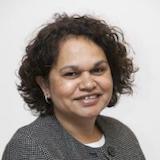
Professor Sandra Eades
IDN Steering Committee Co-Chair
Rowden White Chair and Associate Dean - Indigenous, Medicine, Dentistry and Health Sciences, University of Melbourne.
Professor Sandra Eades is a Noongar woman from Mount Barker, WA. She completed her medical degree in 1990 and after working as a GP, started her career in health research at the Telethon Kids Institute. In 2003 she became Australia's first Aboriginal medical doctor to be awarded a PhD. Her PhD investigated the causal pathways and determinants of health among Aboriginal infants in the first year of life. Professor Eades was named NSW Woman of the Year 2006 in recognition of her research contributions to Aboriginal communities and has received a 'Deadly Award' (National Aboriginal and Torres Strait Islander Awards) for Outstanding Achievement in Health. As well as Associate Dean (Indigenous), she is a Professor at the Centre for Epidemiology and Biostatistics, Melbourne School of Population and Global Health.
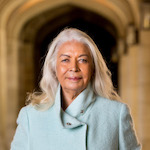
Professor Marcia Langton
IDN Steering Committee Co-Chair
Associate Provost, Foundation Chair of Australian Indigenous Studies, Redmond Barry Distinguished Professor, Director - Indigenous Studies Unit (CHE, MSPGH, MDHS).
Professor Marcia Langton AM is an anthropologist and geographer, and since 2000 has held the Foundation Chair of Australian Indigenous Studies at the University of Melbourne. She has produced a large body of knowledge in the areas of political and legal anthropology, Indigenous agreements and engagement with the minerals industry, and Indigenous culture and art. Her role in the Empowered Communities project under contract to the Department of Prime Minister and Cabinet and as a member of the Expert Panel on Constitutional Recognition of Indigenous Australians are evidence of Professor Langton's academic reputation, policy commitment and impact, alongside her role as a prominent public intellectual. Professor Langton is a Fellow of the Academy of Social Sciences in Australia, a Fellow of Trinity College, Melbourne and an Honorary Fellow of Emmanuel College at the University of Queensland. In 2016 Professor Langton was honoured as a University of Melbourne Redmond Barry Distinguished Professor. In further recognition as one of Australia’s most respected Indigenous Academics Professor Langton has in 2017 been appointed as the first Associate Provost at the University of Melbourne.

Mr Craig Ritchie
Chief Executive Officer, Australian Institute of Aboriginal and Torres Strait Islander Studies (AIATSIS).
Craig Ritchie is an Aboriginal man of the Dhunghutti and Biripi nations and is the Chief Executive Officer at the Australian Institute of Aboriginal and Torres Strait Islander Studies (AIATSIS). Prior to coming to AIATSIS he was Branch Manager, International Mobility in the Australian Government Department of Education and Training. In this role he was the senior departmental executive responsible for the Australian Government’s Endeavour Awards, which support international student and researcher mobility, and policy leadership on qualifications recognition. He was the Departmental lead on the Australian Government’s education relationships in America, the Middle East and Africa, along with APEC and UNESCO. As a senior Public Servant Craig has had responsibility for major systemic reform initiatives including remote primary health care service delivery, place-based community development through the Remote Service Delivery National Partnership. He is one of a small cohort of Indigenous public servants who provide significant leadership in the broader whole-of-government Aboriginal and Torres Strait Islander affairs particularly as a member of the Commonwealth Indigenous Reform Group. He holds adjunct appointments at the University of Sydney (Health Sciences) and the University of Technology Sydney (Indigenous Research).
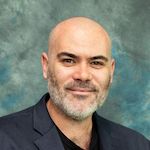
Associate Professor Dan McAullay
Director, Aboriginal Research, Kurongkurl Katitjin, Edith Cowan University.
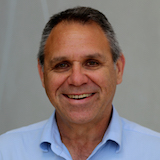
Professor James Ward
Director, Poche Centre for Indigenous Health, University of Queensland.
Professor James Ward is a Pitjantjatjara and Nukunu man, an infectious diseases epidemiologist and a national leader in Aboriginal and Torres Strait Islander research. He is currently the Director of the Poche Centre for Indigenous Health at The University of Queensland.Holding various roles over the last 25 years in Aboriginal public health policy for both government and non-government organisations, in urban regional and remote communities he has built a national program of research in the epidemiology and prevention of infectious diseases, with a particular focus on STIs, HIV and viral hepatitis in Aboriginal and Torres Strait Islander communities. Professor Ward has previously worked at the Kirby Institute, University of New South Wales, Baker IDI in Alice Springs and the South Australian Health and Medical Research Institute. He has served on numerous national and international committees including currently the Communicable Diseases Network of Australia, the Australian National Council on Alcohol and Drugs, the CDNA COVID-19 Working Group and the Aboriginal and Torres Strait Islander COVID-19 Taskforce. He has over 120 publications and leads several large scale public health and infectious diseases studies.
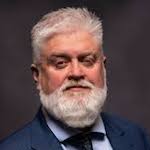
Professor Ian Anderson
Deputy Vice-Chancellor (Student and University Experience), Australian National University
Professor Ian Anderson AO is Deputy Vice-Chancellor (Student and University Experience) at the ANU, a role he took up in March 2020. Professor Anderson is a Palawa man from the northwest coast of Tasmania with traditional ties to country known as Tebrakunna. He was appointed Deputy Secretary of Indigenous Affairs in the Department of Prime Minister and Cabinet in 2017, and was Deputy Chief Executive of the National Indigenous Australians Agency. He has spent most of his professional life working in Indigenous health and education, and graduated as a doctor in 1989. He was awarded his PhD in 2006.
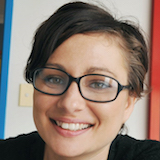
Dr Kalinda Griffiths
Scientia Lecturer, Centre for Big Data Research, University of New South Wales
Dr Kalinda Griffiths is an early career Scientia Lecturer at the Centre for Big Data Research at UNSW, holds honorary positions at Menzies School of Health Research and the University of Melbourne, and is also Aboriginal and Torres Strait Islander Research and Education Lead at the Victorian Comprehensive Cancer Centre. Dr Griffiths is an epidemiologist who has worked in the research sector in a number of roles for over 20 years. Her interest is in empirically addressing complex health disparities in populations through existing data. Her research currently addresses issues of quality and the utilisation of data pertaining to Aboriginal and Torres Strait Islander people. Her areas of focus include the measurement of health disparities, with a particular focus on cancer and Indigenous Data Governance.
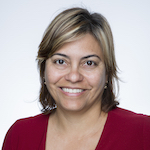
Dr Odette Pearson
Senior Research Fellow, Wardliparingga Aboriginal Research Unit, South Australian Health & Medical Research Institute & and the Sansom Institute for Health Research, University of South Australia.
Odette is a Kuku Yalanji/Torres Strait Islander woman jointly appointed as a Senior Research Fellow with Wardliparingga Aboriginal Research Unit at South Australian Health & Medical Research Institute and the Sansom Institute for Health Research within University of South Australia. Her experience and post-doctoral training in Aboriginal health policy, health systems and inequity comprises a unique comprehensive skillset relevant to existing and emerging complexities of Aboriginal health and well-being. Her work traverses evidence-based policy development, health services research and epidemiology to identify and address health and social disadvantage and strengths among the Aboriginal population. Odette has expertise in (1) primary health care contexts and systems and their linkages with health and social services (2) conceptual development of Aboriginal specific well-being frameworks and indicators, and (3) using social and epidemiological research to develop policy for chronic disease prevention and management. With strong community and cross sector engagement her current research activities focus on how to reduce disadvantage by improving health and social system responses to better meet the needs of Aboriginal people.
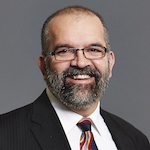
Professor Peter Radoll
Professor of Information Technology and Pro Vice Chancellor, Indigenous at the University of Canberra and Director, Ngunnawal Centre
Professor Peter Radoll is an Anaiwan man of Northern NSW and has over ten years’ experience in senior management and a record of superior results in a number of dynamic and challenging environments. Over fifteen years in the higher education sector and nine years in Indigenous higher education with experience in all aspects of university including teaching, research, staff and student recruitment, marketing, senior management, and staff development. Professor Radoll has conducted research over many years on a range of matters of importance to the Aboriginal community, with a particular emphasis on Information and Communication Technology and Science, Technology, Engineering and Mathematics issues and the digital divide, with findings reported in a number of book chapters, reports and academic publications. He is also a Director on the Board of the Australian Indigenous Leadership Centre (AILC), the Smith Family and a Member of the Advisory Group for the CSIRO Indigenous Girls’ STEM Academy.

Dr Kristen Smith
IDN Research Director
Senior Research Fellow, Research Director - Indigenous Studies Unit (CHE, MSPGH, MDHS)
Dr Kristen Smith is a Senior Research Fellow and the Research Director of the Indigenous Studies Unit in the Centre for Health Equity. Dr Smith is a medical anthropologist whose interdisciplinary work also traverses the fields of Indigenous studies, epidemiology, human geography, public health and health promotion. Her unique contributions to national and international health research includes innovative work in Australian Indigenous medical anthropology, policy analysis, data analysis and complex multidisciplinary theoretical and methodological development. Smith has conducted extensive fieldwork in remote, regional and urban areas with Aboriginal and Torres Strait Islander communities across Australia (NT, QLD, VIC, NSW & WA) on issues including alcohol management, family violence and digital health.
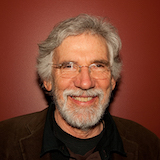
Dr Len Smith
Lead, IDN Technical Reference Group
Honorary Senior Research Fellow, Indigenous Studies Unit, Centre for Health Equity, University of Melbourne, and School of Demography, Australian National University.
Dr Len Smith is a nationally and internationally renowned demographer, with an extensive background of research focusing on Aboriginal and Torres Strait Islander people. Dr Smith was able to reconstitute the Aboriginal population that was not recorded in the Protection Board records and demonstrate how the Victorian Aboriginal community recovered to reach its current strength of over 30,000 people who identified in the last Commonwealth census. Dr Smith is also a member of the IDN Steering Committee.
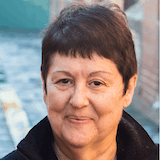
Professor Janet McCalman
Emeritus Redmond Barry Professor, Melbourne School of Population and Global Health, University of Melbourne.
Professor Janet McCalman AC commenced teaching at the University of Melbourne in 1998, in the cross-faculty Centre for the Study of Health & Society. She has taught in both the Arts Faculty and the Faculty of Medicine, Dentistry and Health Sciences, specialising since 2008 in the teaching of interdisciplinary breadth subjects.Since that time she has also pioneered the building of historical life course datasets for demographic and health analysis. She is the author of three multi-award winning books: Struggletown (1984, 1998 and 2021), Journeying (1993), Sex and Suffering (1998), In 2020 she co-edited with Emma Dawson What Happens Next? Reconstructing Australia after COVID 19 and in 2021 Vandemonians: the repressed history of colonial Victoria. All her books have been published by Melbourne University Press.